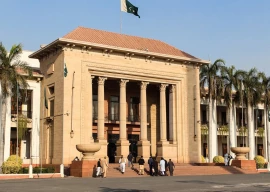
The full text of the whole article is reproduced in the exact form below:
"A person shall not be qualified to be elected or chosen as a member of Majlis-e-Shoora (Parliament) unless he is a citizen of Pakistan; he is, in the case of the National Assembly, not less than twenty -five years of age and is enroled as a voter in any electoral roll in any part of Pakistan, for election to a general seat or a seat reserved for non-Muslims; and any area in a Province from which she seeks membership for election to a seat reserved for women. He is, in the case of Senate, not less than thirty years of age and is enrolled as a voter in any area in a Province or, as the case may be, the Federal Capital or the Federally Administered Tribal Areas, from where he seeks membership; he is of good character and is not commonly known as one who violates Islamic Injunctions; he has adequate knowledge of Islamic teachings and practises obligatory duties prescribed by Islam as well as abstains from major sins; he is sagacious, righteous and non-profligate, honest and ameen, there being no declaration to the contrary by a court of law; he has not, after the establishment of Pakistan, worked against the integrity of the country or opposed the ideology of Pakistan."
Article 62: Disqualification is for life, SC rules in historic verdict
On March 2, 1985, General Ziaul Haq issued The Revival of Constitution of 1973 Order (RCO), changing 67 clauses and sections of 280 articles of the Constitution. It represented the largest number of changes in a single stroke in the history of Pakistan.
Some of the reworked language was clauses in Article 62, which now required members of parliament to meet the conditions of being Sadiq and Ameen – two Arabic terms which were never clearly defined in English, the language of the Constitution.
For years, the clause has been a favourite tool of right-wing politicians, especially those spawned by the Zia regime, to smear ‘liberal’ opponents.
During the same 1985 elections, a member of the Punjab Advisory Council, the eldest son of a Zia confidant who was appointed by the junta, was able to win a seat in the provincial assembly and appointed chief minister. Thus began the rise to prominence of Nawaz Sharif.
Article 62: The landmark verdict
The removal of Article 62, 63 from the Constitution during the drafting of 18th Amendment was opposed by none other than the Pakistan Muslim League-Nawaz (PML-N) itself.
On July 28, 2017, history went full circle when, based on a reading of Article 62, the Supreme Court ordered Nawaz’s disqualification from the National Assembly for ‘dishonesty’ – namely his failure to declare certain assets.
Then, two years ago, Justice Asif Saeed Khosa, in the Ishaq Khan Khakwani case, had described the words Sadiq and Ameen as obscure and impracticable and had also talked about ‘nightmares of interpretation and application that they involved’.
Justice Khosa had stated that some provisions of Article 62 certainly contained strong moral overtones but noted that the provisions introduced by General Ziaul Haq had not been undone by popularly elected parliaments in the last three decades.
He said as long as the said provisions were a part of the Constitution, the courts are obliged not only to decide matters according to the same but also to enforce them whenever called upon to do so.
The judge added that one must not forget that the so-called moral provisions of Articles 62 and 63 of the Constitution were meant to be enforced even against those who claim to have popular support or who have already demonstrated their popular endorsement.

















COMMENTS
Comments are moderated and generally will be posted if they are on-topic and not abusive.
For more information, please see our Comments FAQ